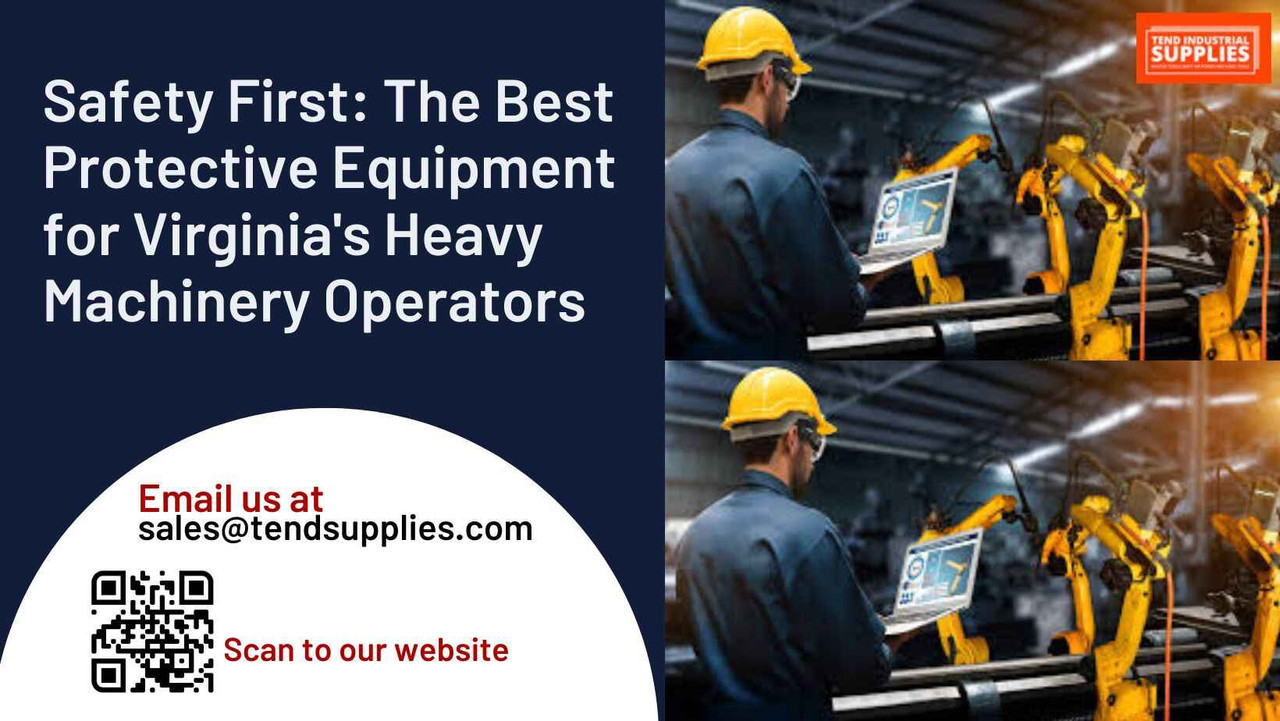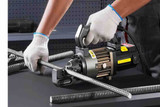Safety First: The Best Protective Equipment for Virginia's Heavy Machinery Operators
Introduction
Operating heavy machinery is an integral part of many industries in Virginia, from construction and agriculture to manufacturing and logistics. However, with the power and scale of such equipment comes the risk of accidents and injuries. Ensuring operator safety is not just a regulatory requirement but a moral obligation for companies, particularly in sectors where the stakes are high. The right protective equipment is essential in safeguarding operators against the common hazards associated with heavy machinery use. This article outlines the key safety risks and provides a comprehensive guide to the best protective gear to ensure safety and compliance in Virginia's heavy machinery operations.
Key Safety Risks for Heavy Machinery Operators
Heavy machinery operation exposes workers to several risks, making it crucial to understand the hazards before selecting the right protective equipment. Some of the most common hazards include:
- Physical Hazards: Machinery components such as moving parts, falling objects, and unstable loads present significant physical risks. Crushing injuries, lacerations, and amputations are unfortunately common without proper safety measures.
- Environmental Hazards: Operators working in extreme temperatures, dusty environments, or areas with poor ventilation face additional risks. In Virginia, the mix of hot summers and frigid winters can further strain equipment operators without appropriate gear.
- Mechanical Hazards: The constant movement of heavy machinery can cause accidental entanglement or impact injuries, while electrical issues can lead to severe shocks if the operator is unprotected.
Real-world case studies illustrate how the lack of proper protective equipment has led to serious injuries. For example, a worker in a Virginia construction site suffered a severe head injury after being struck by a falling object due to not wearing a hard hat. In another instance, an operator suffered permanent hearing loss from prolonged exposure to high decibel noise without adequate ear protection.
Essential Protective Equipment for Heavy Machinery Operators
1. Personal Protective Equipment (PPE) Basics
Personal Protective Equipment (PPE)forms the foundation of any safety plan for machinery operators. Adhering to OSHA and industry-specific safety standards ensures that operators are equipped to handle the risks they face daily.
2. Head Protection
Hard Hats: In environments where falling objects are a concern, wearing impact-resistant hard hats is crucial. These helmets come with different features, including visors and face shields, for added protection. Virginia’s OSHA guidelines recommend Type I and Type II hard hats for construction and industrial settings to protect against both vertical and lateral impacts.
3. Hearing Protection
Heavy machinery often generates noise levels well above the safe threshold of 85 dB. Operators exposed to this noise over extended periods without hearing protection are at risk of permanent hearing damage.
Earplugs vs Earmuffs: Both earplugs and earmuffs offer adequate protection, but choosing between them depends on the environment. Earplugs are ideal for hot conditions, while earmuffs provide better protection in high-decibel areas and are easier to put on and remove when moving between loud and quiet areas.
4. Eye and Face Protection
Dust, debris, and chemical splashes are common in industrial environments. Using safety glasses and face shields ensures that the operator’s vision and facial skin are protected from harmful particles. For environments prone to fogging, anti-fog lenses with impact-resistant frames are highly recommended.
5. Hand Protection
Different tasks require different types of gloves. For example, cut-resistant gloves are essential for tasks involving sharp materials, while heat-resistant gloves are necessary for welding or working near high-temperature equipment. In Virginia’s colder months, thermal gloves may also be needed to ensure comfort and dexterity.
6. Foot Protection
Operators of heavy machinery should invest in steel-toed boots that offer protection against falling objects and provide slip-resistant soles to reduce the risk of slipping in muddy or wet environments. In industries where electrical hazards are present, opting for electrical hazard footwear is a must.
7. Respiratory Protection
In dusty environments or where chemicals are present, using respirators and masks is critical to prevent inhalation of harmful particles. Operators in the marine or chemical industries should look for full-face respirators designed to block out toxic fumes and fine dust particles.
Advanced Safety Gear for Heavy Machinery Operators
High-Visibility Clothing
In environments with low visibility, such as during nighttime operations or in areas with heavy traffic, operators must wear high-visibility (hi-vis) clothing to ensure they are easily seen by other workers and machinery operators. This clothing is typically made with reflective materials that shine brightly under light. Hi-vis vests, jackets, and coveralls are essential, especially for workers operating machinery in construction zones or near highways in Virginia.
Fall Protection Systems
For operators working on elevated machinery or platforms, such as cranes or aerial lifts, fall protection is a critical safety consideration. Safety harnesses and lanyards are the primary components of a fall protection system that ensures the operator is securely attached to a stable anchor point, preventing falls from height. These systems must meet industry standards for weight capacity and durability, making them essential for those working in Virginia's construction and industrial sectors.
Body Protection and Flame-Resistant Clothing
In environments where exposure to extreme heat or fire hazards is likely, such as welding operations or heavy industrial machinery, flame-resistant (FR) clothing is necessary. These protective suits are made from special materials that resist ignition and protect the operator from burns in case of a fire outbreak or high-temperature exposure. FR jackets, pants, and coveralls are essential for operators handling flammable materials or working in areas with high fire risk.
Additional Safety Equipment for Specialized Tasks
Ergonomic Supports
For operators working long hours, ergonomic supports such as back braces and knee pads help reduce strain and fatigue. Prolonged exposure to awkward postures while operating machinery can lead to long-term musculoskeletal injuries, making it essential to use support gear that ensures proper posture and comfort.
Specialized Hand Tools and Accessories
Using insulated tools is crucial when working with machinery that may have electrical hazards. These tools are specifically designed to protect operators from accidental electrical shocks. In addition, anti-vibration gloves can be used to minimize the effects of prolonged exposure to machinery vibrations, which can lead to hand-arm vibration syndrome (HAVS).
Importance of Regular Training and Maintenance
Having the right protective gear is only one aspect of ensuring operator safety. Proper training and regular equipment maintenance are equally crucial. Workers need to be trained on the correct usage of each piece of safety equipment, ensuring that it is worn properly and maintained regularly. Operators should also be familiar with emergency protocols and hazard awareness to ensure they can react quickly and appropriately to unexpected situations.
Additionally, protective equipment must be inspected regularly to ensure it remains in good condition. Damaged or worn-out gear can fail when needed most, putting the operator at risk. By adhering to maintenance schedules and conducting regular inspections, companies can help prevent equipment failure and accidents.
Frequently asked Questions
1. What is the most critical safety gear for heavy machinery operators?
The most critical safety gear depends on the type of machinery and the operating environment, but essential items typically include hard hats, steel-toed boots, eye and ear protection, and high-visibility clothing.
2. How often should protective equipment be inspected?
Protective equipment should be inspected before each use for signs of wear or damage. In addition, regular maintenance schedules should be followed to ensure longevity and effectiveness.
3. What type of gloves should be worn when operating heavy machinery?
The type of gloves depends on the tasks at hand. For general protection, durable leather or cut-resistant gloves are ideal. For specific tasks like welding or working near hot surfaces, heat-resistant gloves should be used.
4. Are fall protection systems necessary for all heavy machinery operators?
Fall protection systems are required for operators working at heights or in areas where there is a risk of falling. This includes operators using cranes, aerial lifts, or scaffolding.
5. How can operators stay safe in high-noise environments?
Operators should wear hearing protection such as earmuffs or earplugs in environments where noise levels exceed 85 dB. Prolonged exposure to high noise levels without protection can lead to permanent hearing damage.
Conclusion
For top-quality safety gear and protective equipment that ensures the safety of heavy machinery operators in Virginia, visit Tend Industrial Supplies. We provide a wide range of durable and certified personal protective equipment (PPE) to meet the needs of any industry. Whether you’re in construction, agriculture, or manufacturing, our expert team is here to help you select the right gear to keep your workers safe. Contact us today for personalized recommendations!









